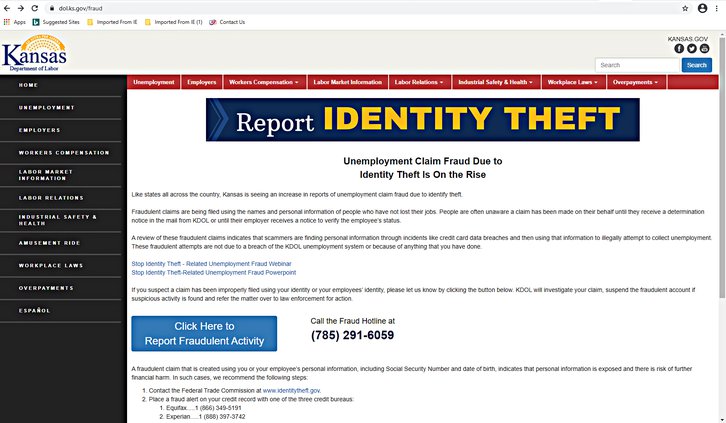With Kansas’ unemployment rate nearly double that of a year ago, it is easy to see the impact of COVID-19 on the jobless picture. And, with the Kansas Department of Labor stopping over 2,000 fake claims daily, it is clear fraud is running rampant, as well.
This begs the question: Do all these fraudulent filings skew the jobless numbers reported by the KDOL? The answer is no, say state officials.
“The fraudulent claims are eliminated from the labor report KDOL puts out on a monthly basis,” said Jerry Grasso, KDOL communications director. “In terms of fraud, we announced a widespread awareness campaign in October.”
Released Dec. 18, the state’s unemployment rate stood at 5.6% in November. This was an increase from 5.0% in October and an increase from 3.1% in November 2019.
Barton County registered a rate of 4.6%, under the state average, compared to 4.1% in September and 2.8% in October 2019.
Even if the unemployment numbers are correct, fraud is a growing problem.
Kansas, like every other state, is seeing a historic increase in reports of fraudulent unemployment claims, Grasso said. To date, KDOL has prevented approximately 220,000 identity theft-related fraudulent claims from being paid out, mostly impacting Pandemic Unemployment Assistance claims.
“We are seeing a record spike in identity theft-related unemployment fraud in Kansas and nationally,” Acting Secretary of Labor Ryan Wright said. “Identity theft is not a nameless, faceless crime. Fraudsters are victimizing our family members, friends, neighbors and coworkers.”
He said his department is working with law enforcement and adding additional layers of protection for Kansans. “But we need your help to combat this growing threat.”
What can employees do?
In response, back in October, KDOL created the www.ReportFraud.ks.gov website. The site serves as a one-stop shop for any person who suspects she or he may have been a victim of identity theft.
“The Report Fraud website enables Kansans to take immediate action when they find out they have been victims of identity theft, stopping the claim being made in their names,” Grasso said.
Fraudulent claims are filed using the names and Personally Identifiable Information (PII) of people who have not lost their jobs. Employees are often unaware a claim has been made on their behalf until they receive a “Notice of Determination” letter in the mail from KDOL or until their employer receives a notice to verify the employee’s status.
“A review of these fraudulent claims indicates that scammers are obtaining personal information through activities such as credit card data breaches, email phishing schemes or sophisticated cyber-security attacks and using that information to illegally attempt to collect unemployment insurance,” Wright said. “Consumers need to be vigilant, and if they find they are impacted, immediately take action.”
KDOL is taking multiple steps to investigate these fraudulent claims and hold those responsible accountable. The agency is putting in place a number of measures, including doubling the size of the fraud and special investigation unit and deploying specialized technology.
“KDOL is a law enforcement agency and we will not stop pursuing these fraudsters. We are working with every traditional and digital tool available to help us track and stop these criminals. They will eventually be caught and punished,” Wright said.
Once a suspected identity theft claim is reported on the site, the system generates a police report number and tips for victims. The fraud team is then able to prevent the fraudulent claims from being paid.
If a fraudulent claim is created using an employee’s PII, including Social Security number and/or date of birth, that employee’s information has officially been exposed, putting this person at risk for further harm. Unfortunately, KDOL is only able to address identity theft related to suspected fraudulent unemployment claims, Grasso said.
Reporting an instance of identity theft to KDOL is not a replacement for taking additional steps to protect an individual’s personal information, such as notifying financial institutions or credit bureaus, he stressed. The public is encouraged to regularly check their credit reports.
What can employers do?
Along with these measures, KDOL is reaching out to employers across Kansas to raise awareness and alert them to the growing number of cases where scammers have reached out to multiple employees of the same business.
Because of the 72-hour hold the department puts on new claims to investigate, this is keeping Kansans from being paid unemployment insurance benefits more quickly, Wright said. “We know we have paid some dollars to fraudsters, at nationwide taxpayer expense.”
They are placing this hold on new claimants because they must be good stewards of taxpayer dollars, he said. “This is our obligation to ensure we are not paying out to fraudsters.”
KDOL has instituted an employer section on the website so employers can file more than one employee fraudulent claim at a time.
In addition, “we are working with other states utilizing digital tools and technology to investigate the fraudsters,” Grasso said. The U.S. Department of Labor estimates the total impact nationwide to be between $8-26 billion.
“We have created this easy to use website as a simple way for individuals and businesses to report any suspected cases of identity theft related to an unemployment claim,” Wright said. “In addition to being able to report suspicious activity, we have also provided a number of resources for those who have become victims to identity theft to protect themselves.”





